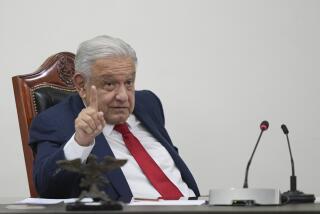Mexico Leaves Castro’s Cuba Behind
Once upon a time, Mexico and Cuba were best buddies in the Western Hemisphere. Brandishing the banners of nonintervention and self-determination, both countries provided each other with unconditional support and kept quiet about their mutual lack of democratic development. Those days are over, and today relations between Cuba and Mexico are at an all-time low, for all the right reasons. Mexico’s foreign policy toward Cuba is changing, and Fidel Castro is furious about it.
The comandante is lashing out against Jorge Castaneda, Mexico’s minister of foreign affairs--calling him a lackey of the United States--out of sheer desperation and growing isolation. Castro’s anger is proportional to the size of Mexico’s foreign policy shift. Castro would like to keep Cuba-Mexico relations as suspended in time as the city of Havana. He would like nonintervention in other countries’ affairs to prevail so that he can hide what happens to his own people.
But Mexico no longer wants to revere the Cuban revolution or ignore its shortcomings, and Castro resents the change of course. Mexico seeks to promote human rights; Castro doesn’t even know what they are. Mexico will continue to oppose the U.S. embargo while at the same time recognizing that it can’t justify the lack of democracy on the island.
Castro is trying to stop a substantive policy shift by turning it into a personal attack that will prompt the removal of Castaneda from his post. As he has done for years with the Cuban people, Castro wants to distract attention from the heart of the matter.
And, up until now, he has achieved his objective. The Mexican left-wing intelligentsia and opposition members of Congress have spent the last two weeks developing a dictionary of synonyms wherein “Jorge Castaneda” means cynic, diabolical, Machiavellian, peon of American foreign policy and so on.
Anyone who knows Mexico’s foreign affairs minister would agree that some of these epithets have a reason for being. Castaneda believes--like Che Guevara, whom he wrote a book about--that to win in politics one must be willing to spill blood.
But the issue is not Castaneda’s personal flaws; it’s his vision of Mexico’s new foreign policy. Castaneda is revising stances because they no longer work. Human rights have become a legitimate concern of an international community that Mexico wants to be a part of. The world has changed and therefore Mexico’s position on Cuba must too.
Therefore it makes sense for Mexico to assume a more active role on the Human Rights Commission in Geneva. It makes sense for Mexico’s President Vicente Fox to meet with Cuban dissidents and recognize that they exist.
It makes sense for Castaneda to argue that the relationship with the Cuban revolution has ended, and the relationship with the Cuban republic has begun. Mexico is demonstrating that it understands the changes in the international environment and wants to be part of them.
Cuba cannot be treated as an exception to the rule in Mexico’s foreign policy and remain immune to criticism because of an anachronistic friendship based on a complicit silence. Where human rights and democracy are concerned, Castaneda and Mexico’s new foreign policy are on the right side of history.
As the cases of Augusto Pinochet and Slobodan Milosevic prove, human rights are no longer an exclusively domestic affair, and the Mexican left needs to understand that nonintervention is a principle whose time has passed.
This tempest in the Cuba-Mexico teapot will pass. Meanwhile, Mexico’s foreign policy will have changed and for the better. The principle of the protection of human rights will prevail in Mexico and elsewhere. As Castaneda’s father, Mexico’s minister of foreign affairs 20 years ago, said: “Friend, when you defend principles instead of interests, you never lose.”
More to Read
Sign up for Essential California
The most important California stories and recommendations in your inbox every morning.
You may occasionally receive promotional content from the Los Angeles Times.










